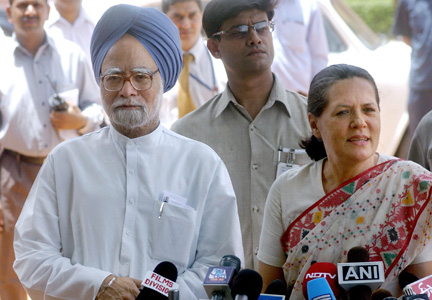Singh, Manmohan (1932-…), was prime minister of India from 2004 to 2014. He was the first non-Hindu and the first Sikh to hold that office. A high-ranking member of the Congress Party, Singh was named prime minister after party leader Sonia Gandhi refused the post. Congress had just won the most seats in the Lok Sabha, the more powerful of the two houses in India’s Parliament. Congress won the most seats in the Lok Sabha in elections in 2009, and Singh was again chosen as prime minister.

Singh previously served as finance minister from 1991 to 1996 under Prime Minister P. V. Narasimha Rao. As finance minister, Singh was widely considered to be the main person responsible for saving India from economic ruin in the early 1990’s. He introduced a reform program that ended many controls and regulations on business activity, lowered taxes and tariffs, and opened the country to foreign investment. As a result, India’s economy greatly improved, and inflation was reduced. Singh supports a mixed economy, in which some industries are under private control and others are under government control. He also believes that India’s government should maintain its secular (nonreligious) character.
Singh was born on Sept. 26, 1932, in Gah, a town near Chakwal in what is now the Pakistani province of Punjab. In the mid-1940’s, Singh’s family moved to Amritsar, the holy city of the Sikhs, in what is now the Indian state of Punjab. He was educated at Panjab University in Chandigarh, India, and Cambridge and Oxford universities in the United Kingdom. In 1957, he began teaching economics at Panjab University. While there, he received his doctor’s degree in economics from Oxford University. In 1969, he became a professor at the Delhi School of Economics.
Beginning in 1971, Singh served in a variety of civil service positions relating to economics, finance, and trade. For example, from 1982 to 1985, he was governor of the Reserve Bank of India, and from 1985 to 1987, he was deputy chairman of India’s Planning Commission. He has also held positions with the International Monetary Fund and the Asian Development Bank. He has served in the Rajya Sabha, the less powerful of the two houses in India’s Parliament, since 1991. In 1999, Singh ran for a seat in the Lok Sabha but lost.
